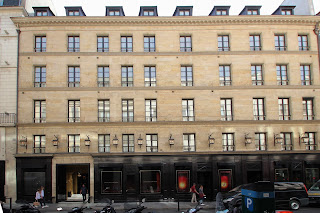France At War (1940) by W. Somerset Maugham -- First Edition
+by+W.+Somerset+Maugha,+First+Edition.jpeg) |
| France At War, First Edition By W. Somerset Maugham |
France At War (London: Heinemann, 1940)
France At War is one of the books of propaganda that W. Somerset Maugham wrote during WWII, as a show of patriotism towards his country using the skills he had to make whatever contributions he could.
Besides talking about what this book is about and the first edition, I will also discuss some of the background, without which the reader would have lost a lot of savour of the book.
France At War
The book consists of articles that were originally published in newspaper, as Maugham himself told us:
My articles had attracted a good deal of attention, and it was decided to issue them as a sixpenny pamphlet. This came out and, I think to everybody’s surprise, certainly to mine, was a success; within two days the first edition of forty thousand copes were sold. [1]
The book itself, as a mature Maugham work, is written in a smooth and deceivingly facile style. It is delightful to read as a collection of essays.
As propaganda, it is written to move and influence the reader’s sentiment. In appropriate places Maugham would give the addresses to which the reader could write to donate money or books. It serves as an interesting piece of historical record.
Maugham writes about his impressions of the French people, and what the effects of mobilizations have on them, especially those unfortunate souls who are driven from their homes in Alsace-Lorraine.
In a few words, Maugham brings out their predicament, the German-speaking French exiled from home, depending on the reluctant charity of strangers, in a time when everything German is a sensitive and prejudiced subject.
The pictures that Maugham paints, as propaganda requires, is uplifting, positive, and sentimental. Nevertheless, he also writes about how ridiculous the situation is from a humanitarian point of view:
I wish I could give the reader some impression of the immense complication of the labour that goes to produce almost everything that is needed to kill men with. [2]
But it is grim to see this multitude of women occupied in making all manner of things to kill and maim the husbands and brothers of other women. […] It is grim to see them so neatly painting and vanishing the cases of big shells. [3]
Maugham gives a survey of the French army and navy. Stott doesn’t have a very high opinion of the book or the effort:
It gave what proved to be an inaccurate picture of French morale at that time, which is surprising considering Maugham’s knowledge of France and her people, but the fault was not altogether his and he sets out elsewhere the facts and obstacles he met with during its composition. Publication was discontinued on the fall of France. [4]
Stott’s comment is surprising considering the external evidence that is available concerning the writing of the book.
France At War and Strictly Personal
France At War is one of those books that doesn’t tell much reading it on its own.
Maugham comments in a later book, Strictly Personal, about it. He explains how he came by the job, the difficulties he encountered then, and how he was inhibited to write what he saw:
I had been asked then to make a private report of the state of mind in France. [5]
I did not much fancy the job that was assigned to me, for I had kept on hoping that I should be asked to do something which did not involve writing, but there was no help for it, and I at once set about making my arrangements. It was absurd to try to write the suggested articles without much more information than I then had, but fortunately I had an intimate friend in the Bureau of Information in Paris. I telegraphed to him asking for his help. He was an energetic man, and on receipt of my telegram he called me on the telephone and told me that if I would come up to Paris at once he would put me in the way of getting the material I needed. Next morning I arrived. I had been used to stay at the Hôtel de France et Choiseul, a pleasantly old-fashioned inn still furnished with furniture bought under the first Empire, which I liked because it had something of the atmosphere of a Balzac novel, but this was closed since the directors and most of the staff were mobilized, and I went to the adjacent Hôtel Vendome. [6]
At this point, it would be interesting to break from Maugham’s published account of what he did.
I hope the reader wouldn’t mind being diverted. After all, any historical reference is very useful to put a work in perspective.
 |
| Hôtel de France et Choiseul |
The hotel that Maugham mentions that he likes to stay, the Hôtel de France et Choiseul, is no longer under the same name.
 |
| Hôtel Costes |
It is now called Hôtel Costes, one of the luxury hotels in Paris.
 |
| Hôtel Vendome |
The Hôtel Vendome is another one, but it has retained its name.
While staying at the Hôtel Vendome, Maugham wrote a letter to Lady Duff:
Nov. 7 [1939]
Hotel Vendome
Paris
Dearest Juliet and Simon
One letter for both of you because I am frantically busy. (I couldn’t imagine who addresses me from Bulbridge House as dear Mr. Maugham and had to look at the signature. Poor Simon. Notwithstanding his delicacy I diagnose a boil on the bottom. Most painful and undignified.) I have got a job at last. I have just come back from a week at the front, with the French army, but it is no good my starting to tell you anything about that because the censor will probably not pass it. I got back to Paris dog tired—Oh, how they kept me at it, and if you want a bit of good clean fun I recommend driving through a fog at night with no lights in a military car with a driver who doesn’t know the way and goes at fifty miles an hour—and I was hoping to get a few days rest but I have been at it ever since and tomorrow I start off again to visit factories. (What a pity I’m not the Duke of Windsor. He loves that sort of thing and I don’t know a turbine from a ploughshare.) Then I have to go and see the villages and towns to which the inhabitants of Alsace-Lorraine have been evacuated and after there I am to turn my attention to the Navy.
Bulbridge House in 1963
I was asked if I preferred to go out in a battleship, a mine sweeper or a submarine, and without hesitating even for a split second I said I thought a battleship would suit much better and a good big one at that. I think all this business will take me to pretty well the end of the year and then I am told I may have to come to England for a month. In that case I will ask you if I may come down to Bulbridge for a couple of days. I rather think I shall be at Southampton for a minimum of two and I might combine it with that. Please tell Mrs. Andrews that I gave the Windsors some of the scones she taught me to make and the Duke liked them so much that he did the strong man shift and insisted on the duchess eating some notwithstanding her plaintiff cry that she never had anything for tea. I was so glad to get your news of everybody. I should like to see Simon as a Marine. When they came to Villefranche with the fleet they had such a success. Everyone says they’re such a nice type of man. I hope he’ll keep up with the traditions. My love to all of you.
Willie [7]
It gives another side, definitely more intimate, of what Maugham was undergoing at that time.
After witnessing what the French refugees had gone through and were going through, Maugham felt obliged to tell their story:
I should have been hard put to it to write my article except for the courage and good nature of the refugees themselves. I dwelt lightly on their miseries and spoke chiefly of the ingenuity they showed in making their lives tolerable, their cleanliness and order in those unspeakable surroundings, the excellent meals they prepared on their makeshift stoves, their kindness to one another and the brave determination with which they made the best of their intolerable condition. I came away with a great admiration for those tenacious, industrious, honest and good-humoured people. [8]
It was just before Christmas that Maugham started writing the articles. Even though he realized that he couldn’t tell all what he thought, he made a tremendous effort to write them well:
I sweated blood over these trivial little pieces. Much of my subject matter was dull, and I wanted to make them interesting; I wanted too to be truthful, and yet I was obliged to leaves some of the truth unsaid; and for my own sake I wanted to write them as well as I could. Even though they would appear in a newspaper and be forgotten the day after publication, I could not bear the thought of letting something go out that was written in a careless and slovenly fashion. I am a very poor journalist. [9]
After this assignment, he went over to the United States to work on similar projects and produced a series of articles and a novel, The Hour Before the Dawn, attempting to bridge the gap between the British and the Americans.
Calder suspects that there was much more that was going on under the table involving Maugham, that up to the end of his life, he was still in the intelligence service [10]. More records released in the future will testify whether this is true or not.
France At War — First Edition
The first edition according to Stott was published in March 1940 in UK and in April in US, but Calder writes that it was in April [11]. The Ministry of Information purchased 4,000 copies for free distribution.
My copy is the UK first edition. Different from other books published during war time, the papers are thick, which could be due to the involvement of the Ministry of Information in the design of the book format.
Cheap copies are still readily available.
France At Warat AbeBooks
France At Warat Amazon.com
France At Warat AmazonUK
NOTES
[1] Maugham, Somerset W. Strictly Personal. Doubleday, Doran and Company, 1941. 133-4.
[2] Ibid. 42.
[3] Ibid. 51.
[4] Stott, Ramon Toole. A Bibliography of the Works of W. Somerset Maugham. London: Kaye & Ward, 1973. 128.
[5] Strictly Personal 69.
[6] Ibid. 71.
[7] Rothchild, Loren R., ed. The Letters of W. Somerset Maugham to Lady Juliet Duff. California: Rasselas Press, 1982. 22-4.
[8] Strictly Personal 108.
[9] Ibid. 118.
[10] Calder, Robert. Willie. The Life of W. Somerset Maugham. London: Heinemann, 1990. 271-2.
[11] Ibid. 271.


I've posted photos of the letter to Eddie Marsh in the UK edition of Strictly Personal; if you like to have a look at it, see here and here.
ReplyDeleteThanks a lot, Alexander!
Delete